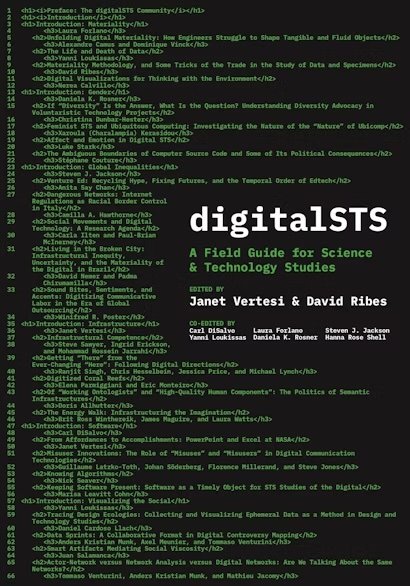Here are some recent publications:
Computational Universalism, or, Attending to Relationalities at Scale
A programmatic paper that cautions social and humanistic scholars in adopting the terminologies of computing as our own analytical categories, such as ‘data’, ‘algorithms’, ‘platforms’ and 'domains.’
Co-authored w/ Francis Lee.
Technical Responses to Critique: The Case of Skin Tone
Drawing from the sociology of critical capacities and valuation studies, we ask, how do technical actors respond to critique by developing new technologies? We inspect the case of skin tone bias in photography, and technical responses in the form of machine learning tools that aim to be sensitive to diverse subjects.
Led by HCDE Doctoral Student Sayan Bhattacharjee
This paper was awarded an Honorable Mention at CHI
Digital methods in STS: Continuities, discontinuities, and reconfigurations
An encylopedia style entry that traverses the history of digital methods in STS (in which we argue, we have never been not-digital).
Co-authored w/ Janet Vertesi
From Methodological Symmetry to Gaia: Latour’s Legacy and Untapped Potential for IS Research
A kindof theory obituary for sociologist of science Bruno Latour who passed in 2023. The paper is written with my Norwegian colleagues, and primarily directed at the field of Information Systems (IS).
It emphasizes the influence of Latour’s materialism and empiricism in IS, and how his ideas about Gaia (ie. agentic Nature) and data (ie. circulating reference) remain untapped in the field.
Fun
Historical Friction: Pacing Ourselves in HCI
A public statement on the challenges of publication pacing in Human Computer Interaction spaces (HCI), especially proceedings publications (ACM), rooted in how poorly this pacing fits with the rhythms of historical research, and really, scholarly life more widely.
A cheeky afterword that I wrote for the Open Access edited volume Interrogating Datafication.
The basic argument (drawn from the Pragmatist work of James and Latour) is that we do not shift from an analog to a digital state in a single leap, as implied by words like digitization or datafication. Instead, digitization is a process, bottomlessly hungry, needing to be accomplished again and again, and, in practice, it is never done again as it was before, even while digitization always promises to be the last time you will have to do it.
Here are three key publications to understand my scholarship today:
The keystone of my investigations of universal ambitions in computing.
Computer scientists, and other information technologists, use the term ‘domain’ to identify parts of the world they’d like to capture and intervene on. A domain is a bounded worldly sphere, but in computing circles there is also something beyond domains, ‘independent’ or ‘agnostic’ of them, which is the ultimate target of computational capacity development.
This paper tracks ‘domain talk’ from symbolic artificial intelligence in the 1960s, through software engineering in the 1980s, to science policy starting in the 2000s.
The logic of domains is a primary — but not the only — organizing principle for computation.
I’ve written a lot more about the logic of domains (LOD), and there is more research to come….
Organizing For Ontological Change: The Kernel of an AIDS Research Infrastructure
How can research infrastructures support the investigation of things that don’t exist yet? This paper tracks how the Multicenter AIDS Cohort Study (MACS) has supported investigations of AIDS since ‘before’ HIV, across the transition from fatal to chronic, and into things like ‘aging with HIV’ today (something wholly outside the scope of consideration in 1983). The answer, in sum, is that they have provided interoperated resources, like blood and data, across years and then decades.
My forthcoming book is based on this paper.
The Long Now Of Technology Infrastructure
A comparative study of the kinds of challenges that research infrastructures face in the ‘long now’. The long now (inspired by Stewart Brand) means navigating between the tensions of immediacy and long term planning. The paper identifies nine such tensions and empirically illustrates them. Things like supporting maintenance or offering new (but unstable) technologies…
Other good publications…
digitalSTS: A Field Guide for Science & Technology Studies
An edited Open Access volume focusing on ‘the digital’ and that draws from the many theoretical and methodological threads that animate investigations in STS.
Senior Editors: Janet Vertesi and David Ribes
How I Learned What a Domain Was
A reflexive paper that tracks i) my first encounters with the term ‘domain’ in computational circles and ii) how I approached the investigation as a grounded theory analysis.
This paper is both substantive (about ‘domains’) and methodological (grounded theory). The title is an homage to Howie Becker’s classic paper, How I Learned What Crock Was.
STS, Meet Data Science, Once Again
A reflection on the envisioned role of social scientists in data science projects. I argue for an ‘elective affinity’ (Weber) between data science and STS, with both fields learning by working across disciplines and fields, but doing so for very different reasons.
Trace ethnography: Following coordination through documentary practices
A methods paper on how the ethnographic sensibility can be sustained when achieving copresense via documents, log files, code, and other inscriptions.
This paper is the methodological-companion piece to The Work of Sustaining Order in Wikipedia , read it to see trace ethno in action!
All coauthored with Stuart Geiger.
Ethnography of Scaling, Or, How to fit a National Infrastructure in the Room
A methods paper that turns the ethnographic gaze to actors’ methods of scaling, that is, the practical ways in which the scale of ‘large things’ are known and engaged. It is partly ethnomethodological, and partly actor-network theory.
‘Beautiful Seams’: Strategic Revelations and Concealments
Recounts a debate rooted in Ubiquitous Computing and Human Computer Interaction over whether we should design ‘seamlessly’ or ‘seamfully’. Rather than picking a side, the paper argues seamfullness and seamlessness are complements, both serving as resources for designers. Which is something along the lines of what Mark Weiser meant by ‘beautiful seams’ …
Time For Historicism: An Invitation
A methodological and programmatic paper directed at the CSCW/HCI community calling for longer views in investigating technology and sociotechnical practices.
Sedimentary legacy and the disturbing recurrence of the human in long-term ecological research
You can change infrastructure to adapt to new scientific understandings, but only slowly and not totally.
This paper is an exploration of the shifting concept of ‘human disturbance’ in long-term ecological research, and how old decisions ecologists made about Nature in the 1920s, makes it hard, but not impossible, for them to study human disturbances today.




















